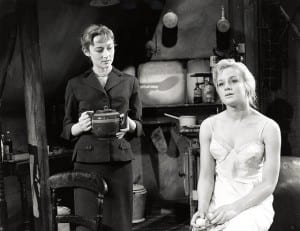How did theatre become mainstream in Britain? This particular blog outlines a brief history on British Theatre.
Before our National Theatre was established, British Theatre came quite late as various movements and productions from different nations would make their way to Britain to artistically express themselves e.g. Avant-Garde was always coming from other countries. Although by 1956, John Osbourne’s Look Back in Anger garnered some popularity, courtesy of George Devine’s decision to produce Osbourne’s work with the English Stage Company at the Royal Court Theatre. Devine was influenced by his understanding of the continental experimental theatre, and therefore brought it to England with Look Back in Anger as an experiment.

Look Back in Anger was a provocation and is now considered to be a landmark in 20th century theatre, because it was considered a new experimental piece in comparison to the gritty studies of everyday life that other theatre companies seemed obligated to produce during the 1950s (2012). Since the success of Look Back in Anger, The Royal Court Theatre allowed English playwrights to express themselves, and certain movements were also established. For instance, the job of the director was to serve the text, and experimental political theatre playwrights were given ‘the Right to Fail’ as a way to express themselves freely as ‘Angry Young Men’ (Hudson, 2014).
Prior to 1961, a National Theatre was not established, although it was considered to be great idea for British society to have one (it is worth noting in this instance that Britain opened their National Theatre, 300 years after a National Theatre in France was unveiled). In the same year as the unveiling of the British National Theatre, the Royal Shakespeare Company was also introduced.
The 1970s saw more experimental, along with fringe theatre. Although, the 1980s saw a decline in new work and writers, along with replays of productions of the past. However, by the 1990s British Theatre was introduced to an array of new, young, edgy and contemporary first time writers, who avoided remaking Shakespearean plays. Writers such as Sarah Kane, Mark Ravenhill and Anthony Neilson who were described as people who have something to say, rose to prominence during the 1990s for their work involving naturalism and nothing else. These writers allowed critic Aleks Sierz to coin the term In-Yer-Face Theatre, for their willingness to experiment with extremism.
Finally, this brief history brings us the era of the noughties. From the year 2000 and beyond, we have seen the rise of the verbatim plays, presenting us with big issues that are current, and tribunal plays. However, ethical issues were raised such as the fact that verbatim plays focused on real issues. One such example of a verbatim play is Alan Rickman’s My Name is Rachel Corrie, which is based on a number of diary entries and emails of Rachel Corrie, a peace activist who tragically died during a protest against the Israel Defence Forces in Gaza. Another ethical issue verbatim plays have raised is the question of whether or not these plays are theatrical or dramatic.
This brief history of British theatre brings me to an analysis of a particular play that embodies a number of key facts that were outlined above. Simon Stephens’ Pornography is considered as a rather shocking play because of its context. Pornography centres on key events that occurred in Britain in 2005. In particular, the announcement of London hosting the 2012 Olympics and the tragic 7th July bombings in London. However, neither topics are described or mentioned in the play. Instead, the play includes a constant mentioning of consumer products, as well as a number of multicultural issues. The play’s title is also unexplained in the play, allowing us to speculate the title’s significance to the play. For example, ‘pornography’ is a term that is often objectified and exploitative because of the nature of its content. However, it can be argued that the title of the play is an indirect reference to one of the characters depicted as a ‘suicide bomber’. For instance, as we have subjectified the term ‘pornography’, it is clear in the play that ‘the bomber’ has subjectified his victims in one of the scenes, so this can perhaps be a valid explanation for Stephens’ choice of entitling a verbatim play such as Pornography.
I strongly do believe that the current state of British theatre is on a high note, considering its history of ups and downs.
Works Cited:
Hudson, James (2014) The Dramatic Text: approaching contemporary material. [lecture] Current Issues in Drama, Theatre and Performance DRA9020M-1415, University of Lincoln, 29 October.
Victoria and Albert Museum (2012) ‘Look Back in Anger, 1956’ in The Explosion of New Writing [online] Available from http://www.vam.ac.uk/users/node/8793 [Accessed 27 January 2015].